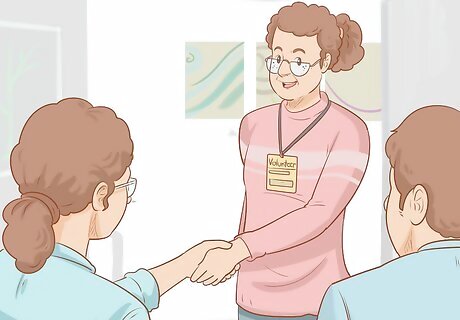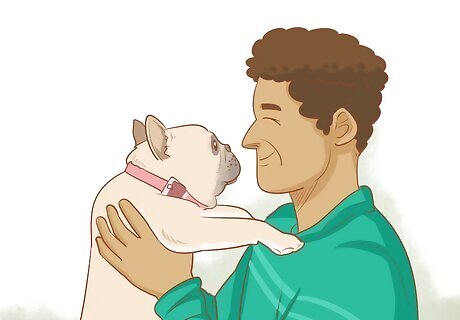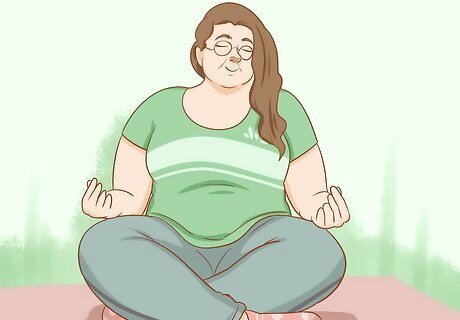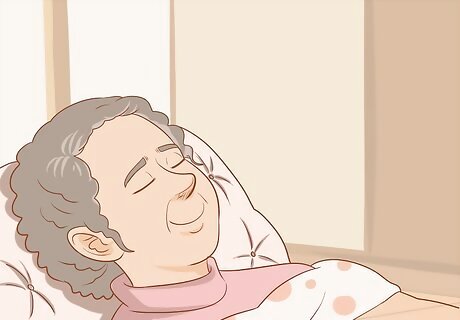
views
Start a new hobby or activity.

Hobbies and activities help you get a lot out of your day. Studying a new language, learning a new musical instrument, or signing up for an academic class are all great ways to keep your mind happily occupied throughout the week. Try learning something you always wanted to learn, but never had the time to invest in. You can even take your current hobbies to the next level by: Tackling a more difficult puzzle Cooking a brand-new recipe Adjusting your golf handicap
Sign up for volunteer opportunities each week.

Volunteering boosts your mood and helps your community. Aim for around 2 hours of volunteer work each week so that you feel like you're giving back to the community and living a more fulfilling life. Studies show that people who make time to help others often feel happier themselves. Here are a few ways you could help your local community: Helping out at toy drives Coaching a community sports team Managing a fundraiser Working with an established volunteer organization
Explore the outdoors.

Spending time outside can boost your mental health. Going for a nice, relaxing stroll outside is a surefire way to boost your mood, especially if you soak in a lot of natural light. In fact, taking a walk outside helps calm your mind down, which in turn lowers your blood pressure and pulse. Here are a few ways to spend a little extra time with Mother Earth: Walking around your neighborhood Heading to the local park Going for a hike Sitting on your deck or porch
Adopt a dog to boost your mental and physical health.

Caring for a dog gives you lots of opportunities to exercise and enjoy the fresh air. As an added bonus, some studies show that owning a dog can lower your anxiety levels, decrease your overall blood pressure, and boost your chances of making it through a heart attack. Think about adopting a dog instead of buying one from a breeder. Not only are rescue dogs cheaper than designer pups, but they’re also in desperate need of a safe, loving home. You can feel proud of yourself knowing that you helped give your furry friend a better shot at life.
Spend time with people you love each day.

Staying connected is an essential part of feeling happy and fulfilled. Schedule visits and outings with friends and relatives that live in the area, or set aside time for phone calls and video chats with long-distance friends. Make it your goal to hang out with at least one person each day, which can help you feel more connected and less lonely. Sign up for a class or activity group if you don’t have a lot of friends or relatives in the area.
Continue working if you enjoy it.

Staying at work can be a rewarding way to make the most of your day. Retirement definitely has its perks, but staying employed is a great way to feel active, productive, and fulfilled. The extra paycheck is pretty nice, too! Don’t feel obligated to stay at your job if you don’t like it there. At that point, you’re better off retiring or switching to a low-key, stress-free job.
Practice gratitude.

Gratitude can improve both your mental and physical health. Studies have connected gratitude to improved cholesterol, blood pressure, and even kidney function. It can also do wonders for your mood, and reduce your feelings of hopelessness, depression, and stress. Ready to get started? Here are a few ways you can sprinkle gratitude into your daily routine: Looking for the positives in negative situations Brainstorming at least 5 things that you’re thankful for Jotting down your thankful, positive thoughts in a notebook
Smile and laugh more.

Smiling and laughing can boost your mood and overall health. Your body produces dopamine, serotonin, and endorphins whenever you genuinely smile—these chemicals let you know that you’re feeling good, which gives your happiness levels a boost. Laughing has similar benefits; in fact, some research suggests that people who embrace humor and laughter are more likely to live longer. Here are a few ways to add some more laughter and smiles to your day: Watch a silly movie Look up some jokes online Spend quality time with friends and family
Meditate and do yoga regularly.

Regular meditation and yoga can help keep you sharp. In one particular 12-week study, one group of people practiced yoga and meditation consistently while another group did a regimen of mental exercises. At the end of the study, all of the participants were tested on their mood and memory. You guessed it—the yoga and meditation people reported better results on mood and memory tests.
Focus on what’s in your control.

Worrying can fill up your day, but not in a good way. Take a moment to think about what’s in your realm of control, as well as what isn’t. Then, think of a positive affirmation that you can tell yourself whenever you start focusing on what’s out of your control. Here are a couple of examples: Instead of thinking “I hope I don’t run into Bonnie at work,” think “I’m a strong, capable person, and I can handle whatever work challenges come my way.” Instead of thinking “I hope it isn’t stormy next weekend,” think “I don’t need good weather to have a great time with my friends and family.”
Use some positive thinking strategies.

Transform your negative self-talk into something more positive. Try to isolate and examine your negative thoughts as they enter your mind, like when you doubt your capabilities or view something in a negative light. Then, reframe that thought from a more positive angle. With enough time and practice, positive thinking can be a regular, fulfilling part of your day. Here are a few examples of positive thinking: Instead of thinking “This is too complicated for me to figure out,” think “I’m going to look at this from a different perspective.” Instead of thinking “None of my friends and family ever call me,” think “This is a busy time of year. I’ll call one of my loved ones tomorrow and see how they’re doing.” Instead of thinking, “I can’t handle such a big change,” think “This is new to me, but I can definitely give it a shot.”
Watch the news in moderation.

Constantly tuning into the news isn’t great for your mental health. Most news cycles are filled with negative, sad, and stressful stories that… well, make us feel negative, sad, and stressed. Try to limit your news consumption each day, whether it’s on your TV, computer, or phone. You might: Only watch the news for 30 minutes each night Uninstall news apps from your phone Limit your time on the web
Use Facebook if it makes you happy.

Facebook comes with plenty of pros and cons. For some, the social network is a great way to post regular updates and stay in touch with friends and relatives. For other people, Facebook can contribute to a lot of negative feelings, like jealousy and low self-confidence. Ask yourself how you feel whenever you log onto the social platform and see if it’s really making your life better or not. This advice applies to any social network. However, it’s especially applicable to Facebook, which is one of the top social platforms used by older age demographics.
Eat a healthy diet.

Choose fresh, healthy foods instead of packaged and processed items. Processed meats are full of sodium and preservatives, and eating them regularly may boost your risk of developing heart disease or diabetes. Packaged foods aren’t much better, and can add unnecessary sugar to your diet. Instead, stick with fish, lean meats, and whole grains, along with lots of fruits and veggies—your body will thank you! The Mediterranean diet is a great starting point for healthy eating.
Take all prescribed medications.

Your prescriptions help keep your body in tip-top shape. Believe it or not, over 20% of all Americans never bother to fill and pick up their prescriptions, and around 50% of people don’t even take their long-term medications when they’re supposed to. Prescription meds are meant to help you and are an important part of staying your happiest and healthiest. Here are a few tips to help you remember your meds each day: Sort all of your medications in a weekly pillbox Get in the habit of taking your medicine at the same time Program an alarm or reminder on your mobile phone Flip your pill bottle over so you know that you’ve taken your meds already
Add exercise to your daily routine.

Work your way up to 150 minutes of exercise each week. Pick a physical activity that you really enjoy, like swimming a few laps in your community pool, getting a few sets in at the tennis court, or even going for a walk around your neighborhood. Any type of exercise is great for both your physical and mental health; plus, it may help with some of your aches and pains. Not sure how to get started? Here are a few easy fitness ideas to get you moving: Dancing Riding your bike Doing yoga and tai chi
Aim for 7-9 hours of sleep each night.

It’s hard to get the most out of your day when you’re feeling tired. Step away from any electronics about an hour before your usual bedtime, and refrain from using any backlit tablets or eReaders before bed—this can mess with your body’s usual production of melatonin. While you’re at it, transform your bedroom into a relaxing sleep sanctuary by adjusting your thermostat to a cool temperature and plugging in a sound machine. Turn away any clocks that directly face your bed. Unfortunately, clock-watching and insomnia tend to go hand-in-hand. Some people have an easier time getting to sleep after doing something relaxing before bed, like soaking in a warm bath, listening to relaxing music, or trying progressive muscle relaxation.
Make amends with your relatives.

Reduce your stress levels by letting go of the past. Old arguments and disagreements can lead to a constant sense of stress, which isn’t good for your long-term health. If the situation allows it, try to meet up and chat with people you haven’t seen eye-to-eye with in the past. Burying the hatchet just might save you from a chronic illness or shortened lifespan. Stress can boost your risk of serious health issues, like type 2 diabetes, GI problems, a less effective immune system, and even a stroke or heart attack.



















Comments
0 comment